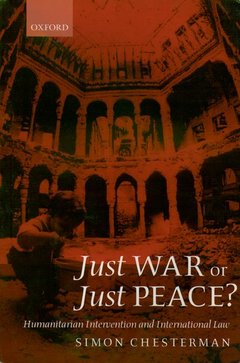Description
Just War or Just Peace?
Humanitarian Intervention and International Law
Oxford Monographs in International Law Series
Author: Chesterman Simon
Language: English
Subjects for Just War or Just Peace?:
Approximative price 77.68 €
Subject to availability at the publisher.
Add to cart
Just war or just peace? humanitarian intervention and international law
Publication date: 11-2002
326 p. · 15.5x23.5 cm · Paperback
Publication date: 11-2002
326 p. · 15.5x23.5 cm · Paperback
Approximative price 140.09 €
Subject to availability at the publisher.
Add to cart
Just war or just peace? humanitarian intervention and international law
Publication date: 01-2001
326 p. · 16.3x24.2 cm · Hardback
Publication date: 01-2001
326 p. · 16.3x24.2 cm · Hardback
Description
/li>Contents
/li>Biography
/li>Comment
/li>
The question of the legality of humanitarian intervention is, at first blush, a simple one. The Charter of the United Nations clearly prohibits the use of force, with the only exceptions being self-defence and enforcement actions authorized by the Security Council. There are, however, long-standing arguments that a right of unilateral intervention pre-existed the Charter. This book, winner of an ASIL Certificate of Merit 2002, begins with an examination of the genealogy of that right, and argues that it might have survived the passage of the Charter, either through a loophole in Article 2(4) or as part of customary international law. It has also been argued that certain `illegitimate' regimes lose the attributes of sovereignty and thereby the protection given by the prohibition of the use of force. None of these arguments is found to have merit, either in principle or in the practice of states. A common justification for a right of unilateral humanitarian intervention concerns the failure of the collective security mechanism created after the Second World War. Chapters 4 and 5, therefore, examine Security Council activism in the 1990s, notable for the plasticity of the circumstances in which the Council was prepared to assert its primary responsibility for international peace and security, and the contingency of its actions on the willingness of states to carry them out. This reduction of the Council's role from a substantive one to a formal one partly explains the recourse to unilateralism in that decade, most spectacularly in relation to the situation in Kosovo. Crucially, the book argues that such unilateral enforcement is not a substitute for but the opposite of collective action. Though often presented as the only alternative to inaction, incorporating a `right' of intervention would lead to more such interventions being undertaken in bad faith, it would be incoherent as a principle, and it would be inimical to the emergence of an international rule of law.
Introduction, 1: The Just War: The origins of humanitarian intervention, 2: The Scourge of War: Humanitarian intervention and the prohibition of the use of force in the UN Charter, 3: 'You, the People': Unilateral intervention to promote democracy, 4: The New Interventionism: Threats to international peace and security and Security Council actions under Chapter. Part 7: of the UN Charter. 5: Passing the Baton: The delegation of Security Council enforcement powers from Kuwait to Kosovo, 6: Just War or Just Peace? Humanitarian intervention, inhumanitarian non-intervention and other peace strategies, Bibliography
Simon Chesterman is a Senior Associate at the International Peace Academy in New York
© 2024 LAVOISIER S.A.S.




